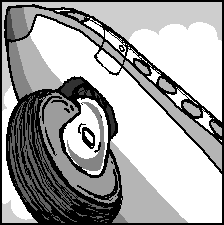Airline
travel has changed in several ways in recent years.
It can be said that the changes have been for
the best, i.e., seat-back video screens, self-check-in,
etc., as much as for the worse, i.e., long security
lines, poor meal quality, etc.
It
will nevertheless remain true that your in-flight
experience begins the moment you reserve an airline
ticket – or when you log on to one of the online
discount airline
tickets resources, to reserve or
book a cheap airline ticket.
Some
people are hasty to complain about long waiting
lines, delayed flights, and other unwanted flight
experiences, but there are several easy and important
steps one can take to prepare and help insure the
efficiency, and most importantly, the quality of
your flight.
This
includes the questions you ask before you book,
and the preparations you make before you board.
Inform
yourself of the airline records.
Look for flights with good on-time performance ratings from the U.S. Department
of Transportation. Check the department's Bureau of Transportation Statistics
Web site before you book, or ask your airline reservationists or travel agent,
particularly if you're scheduling a tight connection or if you absolutely have
to be there on time.
Leave
early, give yourself some leeway.
If
your trip is of particular importance, or if you're
traveling to participate in a once-in-a-lifetime
celebration or other important function, depart
a day early to avoid possible delays that might
make you miss out on the event altogether.
Get
the early flight, travel mornings.
Always try to fly as early as possible the day of your flight -- the first
departures are ideal, if feasible. This is of particular important if you're
traveling during a holiday or within a busy period.
Flight
delays often have ripple effects throughout the
system, so the earlier you leave, the better your
chances of avoiding major clogs or congestions
down the line. And if something does go wrong,
you'll have the rest of your day to straighten
out other options to allow yourself to get where
you're going. On the other hand, avoid taking the
last flight of the day unless you have no other
possible option available.
Think
small ... for airports that is.
The larger the airport the better, right? Wrong. Although some may offer diversified
flight options and other convenient may offer more distractions, random problems
diversions and a greater choice of flights -- but sometimes less can be like
to much. Smaller airports are often easier to move through and offer a better
passenger experience. Long lines at security checkpoints can be a problem at
smaller airports, though, so make sure that isn't the case before you choose
to depart from one.
Avoid
Rush Hours
Stay away from airport rush hours and other peak-travel periods. On business-travel
routes, that's between 8:30 and 10 in the morning and between 4:30 and 6:30
in the afternoon. To Europe, Fridays are busy; coming from Florida, avoid Sundays.
Holiday weekends always flurry.
Non-stop
is better
Travel non-stop whenever you can. Each time you change planes, you increase
the possibility of things going wrong. You become subject to weather and congestion
conditions at not only departing and arriving airports, but at a third, and
thus also increasing the risk of mechanical problems or personnel-related delays
on two airplanes rather than one. Checked luggage has to make the connections,
too. If your connection is to a different carrier, things can get even more
complicated.
Leave
time for connections
Be smart about connections. If you do have to make one, don't cut it too close.
Ask about the minimum connecting times between flights, and then add 20 minutes.
Airline connecting times are best-case scenarios. Don't put yourself in the
position of possibly missing your flight because the gate agent didn't show
up, the elevator didn't work, or someone took forever to get his or her bag
out of the overhead. And have a backup plan: know the alternative flights out,
just in case.
Stay
Loyal
Stick with one or two frequent-flier programs. In addition to racking up free
trips faster, you'll also accumulate more quickly the perks that can make trips
easier. On some airlines, these include a special reservations number, early
boarding, access to upgrades, and roomier economy-class seating.
Luggage
loss prevention
Put your name on the outside of your bags and inside your bags. Even better,
put a copy of your itinerary in each checked bag so the airline can locate
you. The most common causes of lost and delayed bags are late check-ins and
tight connections. Avoid both whenever you can.
Check
the Plan
Seating position isn't just a question of aisle or window. If you require constant
access to your carry-on baggage, for instance, make sure you're not in a bulkhead
seat. Different makes of planes have different layouts, moreover -- so if you
don't want to be stuck next to the lavatory or galley, tell the reservation
agent or check the seating plan.
Pack valuables in your carry-on bags.
Make
sure the person who checks your baggage attaches
the correct destination ticket to every checked
bag, and make sure you have a claim ticket for
each.
Travel insurance is the best guarantee that you'll recoup any losses. See this
guide to travel insurance for
more information.
Anticipate
Problems
Delays happen. So do bad movies, unappetizing meals, and overworked flight
attendants. Bring snack food, water, and sufficient diversions, and you'll
be covered even if you get stuck in the airport, on the tarmac, or in the air
during turbulence (when flight attendants may not be available to assist you).
Keep these things in mind, and you'll find yourself with less on your mind.

